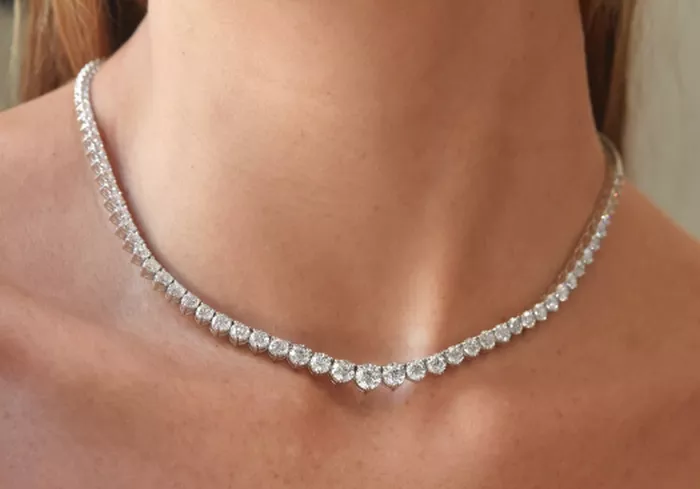Diamonds have long been cherished as symbols of luxury, beauty, and timeless elegance. Whether gifted on a special occasion or purchased as a personal indulgence, a diamond necklace is often one of the most treasured pieces in a jewelry collection. However, with such a valuable and delicate item, many wonder about the practicality and safety of wearing their diamond necklace to bed. Can you sleep with your diamond necklace on? This comprehensive guide will delve into the considerations, potential risks, benefits, and best practices for wearing diamond jewelry overnight.
Understanding the Value and Fragility of Diamond Necklaces
The Intrinsic Value of Diamonds
Diamonds are renowned for their durability, ranking 10 on the Mohs scale of hardness. This exceptional hardness makes them resistant to scratches and damage, theoretically suggesting that they could withstand various conditions, including being worn during sleep. However, the setting and chain of a diamond necklace can be more delicate and susceptible to damage than the diamond itself.
The Craftsmanship of Diamond Necklaces
Diamond necklaces come in various designs, from solitaires to intricate multi-stone arrangements. The settings, such as prongs, bezels, or pavé, play a critical role in securing the diamonds. The craftsmanship involved in these settings often requires precision and care. Any undue pressure or impact can weaken these settings, potentially causing diamonds to become loose or fall out.
Potential Risks of Sleeping with a Diamond Necklace
Physical Damage to the Necklace
Tangled Chains: As you move in your sleep, the chain can become tangled. This tangling can lead to knots that are difficult to undo and may weaken the chain over time.
Pressure on Settings: The weight of your body pressing against the necklace can exert force on the settings, especially prong settings, causing them to bend or break.
Snagging: Bedding, especially with intricate textures like quilts or lace, can catch on the necklace. This snagging can pull on the chain and settings, leading to potential damage or loss of diamonds.
Physical Discomfort and Skin Irritation
Irritation and Imprints: The pressure from sleeping on a diamond necklace can cause skin irritation or leave imprints. People with sensitive skin may experience redness or even minor abrasions.
Allergic Reactions: Some people might have allergic reactions to the metals used in the necklace settings, such as nickel. Prolonged contact overnight can exacerbate these reactions.
Risk to the Diamond and Setting Integrity
Loose Stones: Over time, the consistent pressure and movement can loosen the stones in their settings, increasing the risk of losing a diamond.
Wear and Tear: The friction between the necklace and your skin or bedding can lead to wear and tear, dulling the metal and the stones’ brilliance.
Benefits of Removing Your Diamond Necklace Before Bed
Preserving the Necklace’s Condition
Longevity of Settings: By removing the necklace, you reduce the risk of pressure on the settings, ensuring they remain intact and secure for longer.
Minimizing Wear and Tear: Less exposure to friction and movement helps maintain the necklace’s pristine condition, preserving its beauty and value.
Enhanced Comfort and Sleep Quality
Comfort: Without the necklace, there is no risk of it pressing against your skin, allowing for a more comfortable and restful sleep.
Reduced Anxiety: Knowing that your valuable necklace is safely stored rather than being subjected to potential damage can provide peace of mind, contributing to better sleep quality.
Best Practices for Storing Your Diamond Necklace
Safe Storage Solutions
Jewelry Box: Store your necklace in a soft-lined jewelry box to protect it from scratches and tangling.
Padded Pouch: A padded pouch can provide additional protection, especially if you travel frequently.
Separate Compartments: Ensure the necklace is stored separately from other jewelry pieces to avoid tangling and scratching.
See Also: Can You Wear a Rose Quartz Necklace Every Day?
Routine Maintenance
Regular Cleaning: Clean your diamond necklace regularly using mild soapy water and a soft brush to maintain its sparkle.
Professional Inspection: Have your necklace inspected by a professional jeweler at least once a year to check for loose stones and integrity of the settings.
Situations Where Wearing Your Diamond Necklace Overnight May Be Justified
Special Occasions
Romantic Nights: On special occasions, such as anniversaries or honeymoons, wearing your diamond necklace overnight may enhance the romantic experience and sentimentality.
Travel Scenarios: In certain travel situations, you might feel more secure wearing your valuable jewelry rather than leaving it in a hotel room. However, consider using a travel jewelry case to protect your necklace.
Personal Preferences
Sentimental Value: If the necklace has significant sentimental value, such as a family heirloom, some may prefer to keep it close even while sleeping.
Minimal Movement Sleepers: If you are a minimal movement sleeper and are confident in your sleeping habits, you might choose to wear your necklace overnight. However, this still carries risks and is not generally recommended.
Expert Opinions on Wearing Jewelry to Bed
Insights from Jewelers
Most professional jewelers advise against wearing diamond necklaces to bed. The potential for damage to the necklace, discomfort, and risk of losing stones outweigh the minimal benefits of wearing it overnight. Jewelers emphasize the importance of proper storage and regular maintenance to preserve the longevity and value of diamond jewelry.
Dermatologists’ Perspective
Dermatologists often warn against wearing any jewelry to bed, citing risks of skin irritation and allergic reactions. Prolonged pressure from jewelry can lead to imprints and discomfort, potentially affecting sleep quality.
Conclusion
In conclusion, while diamonds are incredibly durable, the craftsmanship of a diamond necklace requires careful consideration, particularly when it comes to wearing it overnight. The potential risks of physical damage, discomfort, and loss of stones suggest that it is generally best to remove your diamond necklace before bed. Proper storage and routine maintenance are key to preserving the beauty and integrity of your cherished piece. Special occasions or personal preferences might justify occasional exceptions, but overall, prioritizing the safety and longevity of your diamond necklace will ensure it remains a timeless treasure for years to come.

